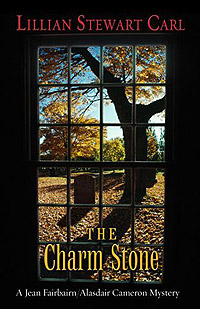
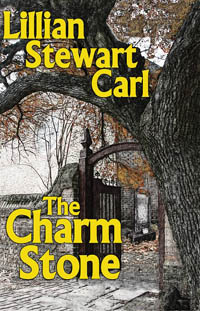
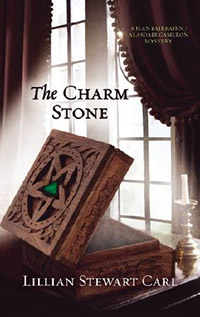
The Charm Stone
The Jean Fairbairn/Alasdair Cameron Series, Book
Four
Five Star Publishing, November 2009
ISBN
978-1-59414-770-8
Wildside Press, November 2011
Trade Paperback 978-1434431004
Worldwide Mystery Book Club, June 2013
ISBN: 978-0-373-26853-5
Find the Book | Kindle |Reviews | Excerpt |
The Jean Fairbairn/Alasdair Cameron series, a cross-genre (mystery, romance, paranormal) series featuring Michael and Rebecca Campbell-Reid from Ashes to Ashes and Dust to Dust in cameo roles.
Beneath the hanging tree…
Witches weren’t burned in the colony of Virginia. They were hanged. But in the twenty-first century no one should be hanged from the trees of Colonial Williamsburg.
Jean Fairbairn’s significant other, ex-Scottish cop Alasdair Cameron, might sometimes wish he could pass judgment on the dingbats Jean writes about. Especially when her current subjects, a set of batty conspiracy theorists, may be involved in the theft of a Williamsburg-crafted replica of the sixteenth-century Witch Box. It was stolen from a Scottish castle for which Alasdair has been supervising security—even though the original Witch Box is safe in a Williamsburg museum.
The charm stone went missing from the original Witch Box two hundred years ago. Perhaps it was not a traditional healing stone at all but a cursing stone. Perhaps it was lost somewhere in the colony of Virginia. Perhaps someone will kill to find it.
Can Jean maintain her resolve to abandon the academic battlefield forever, or will she be tempted back into combat by an appealing former colleague, Matthew Frost? And what about Alasdair, who is supposedly retired from the rigors of law enforcement, but who is now confronted not only by a theft but two murder cases—and by Stephanie Venegas, the detective in charge.
Amid the falling leaves and autumn shadows, Jean and Alasdair must deal again with murder most grotesque, its roots deep in history and myth. With ghosts only they can see. And with things going bump in the night of their own relationship.
It’s All Hallows Eve, in Colonial Williamsburg.
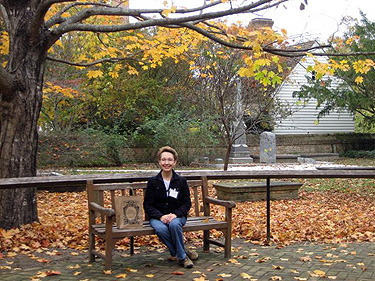
Lillian in Bruton Parish Graveyard, Williamsburg,
Virginia, where important scenes of The Charm Stone
take place:
Cars were ranged outside the church. Not only was it Sunday, it was All Saints
Day, the calm after the Halloween frenzy, when the ghosts and goblins had been
swept back under the carpet. [Jean] strolled in through the side gate and across
the wet-leaf-strewn brick pavement, considering the monuments and tombs beyond
the low barricade. The buried citizens of Williamsburg had no doubt worn as many
shades of gray, ranging from unblemished saintliness to villainy of the darkest
dye, as the people of any locality.
She stepped over the railing onto the wet grass and sodden leaves. Robert Mason,
Robert Mason, come out, come out, wherever you are . . . She would have avoided
walking on graves, except the churchyard was filled with them, mostly unmarked,
the turf no more than a skin atop a jumble of bones and coffin fittings. And
yet she felt not one prickle, nary a shudder, only the sad certainty of mortality.
Reviews
"Carl's well-crafted fourth Jean Fairbairn/Alasdair Cameron mystery
takes Jean, a journalist for travel magazine Great Scot, and Alasdair,
a former detective, from Edinburgh to historic Williamsburg, Va. . . cozy
fans should be satisfied."
-- Publisher's Weekly
"Carl . . . manages to tie up the loose ends, renew Jean and Alasdair's shaky
relationship and describe Williamsburg in a manner that will delight former visitors
and intrigue those who have never been there."
--Kirkus
"Traveling from Scotland to Williamsburg, VA, Scottish ex-cop Alasdair Cameron
and reporter Jean Fairbairn combine overseeing the security of a 16th-century
Witch Box with a little vacation. When murder gets in the way and a Williamsburg-crafted
replica is stolen, they find that quotes from Shakespeare and a missing charm
stone lead them into a real-life tangle. Verdict Readers of Amy Myerss Marsh
and Daughter series will like this fourth series entry."
--Library Journal
"Lillian Stewart Carl pens an extraordinary mystery. Her richly detailed writing
style, her unique slant to the ordinary mystery, and her quirky characters make
for an exceptional and entertaining read. While Jean is a fabulously fun amateur
sleuth who seems to fall into trouble at the drop of a hat and Alasdair is a
retired professional who cannot seem but to follow his hunches, it is obvious
that they make a great team both at solving crime and belonging together. The
Charm Stone incorporates a blending of the past and present to create a delightfully
suspenseful read."
--Melissa Kammer for Noveltalk
"Ms. Carl is skilled at crafting tiny details that speak volumes . . . the author
intertwines several plot lines seamlessly, deftly depicts the beauty and mystery
of Williamsburg, and weaves in an accurate, interesting, and well-researched
history lesson, creating a beautiful tapestry."
--
Shirley Wetzel for Overmydeadbody.com
Top of Page
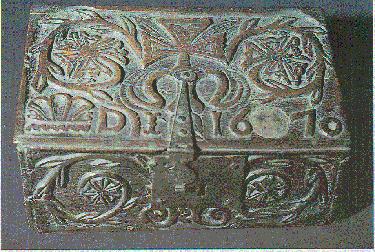
A box bought by Colonial Williamsburg archaeologist
Ivor Noel Hume, its heavily carved oak
designed around a shilling of Elizabeth I, with the initials D.J. and the date
1670.
Noel Hume writes, "...hiding in much lower
relief on either side of the cross and encompassed
by foliate scrolls, two small, seemingly demonic
faces leered up at me.... Who was D.J., and
why did he have his box designed around a shilling
that was 70 and more years old...are those
secretive faces the key? Is it possible that the
box had some role to play in witchcraft or demonology?"
From The Journal of the Colonial Williamsburg Foundation, Spring 1995
Excerpt
Chapter One
Jean Fairbairn angled her toothbrush away from the one already in the glass beside the sink, giving them each some personal space. Although, considering how many body fluids she and Alasdair had swapped over the last couple of months, moving their toothbrushes was no more than symbolic.
She wondered if she would ever get used to Alasdair complicating the life she’d gone to so much effort to simplify. She wondered if he’d ever get used to her complicating a life that had never been simple.
In the bedroom, Alasdair spoke in staccato bursts interspersed with moments of silence as he listened to whoever was on the other end of the telephone line. Or transatlantic satellite transmission, perhaps—the male voice that had asked for him spoke with his own Scottish accent. What was up back home? It was almost midnight there.
“That’s not sensible at all,” her significant other, her other half, was saying.
She’d pretended not to eavesdrop long enough. With one last glance in the mirror—so she looked a little frayed around the edges, it was just the jet lag—Jean strolled out of the bathroom as nonchalantly as she could wearing a long dress and high heels. Or heels higher than usual, the better to achieve this evening’s level of posh.
It would take heels of nosebleed height to boost her to even average stature. But that wasn’t the issue. Her forty-year-old feet, attached to her forty-year-old body, were the issue. Tripping over her own shoes would threaten more than her dignity. But the demands of fashion were far down the list of worries that had over the last couple of years evoked silver strands from her crown of auburn hair. At least, in a rare moment of style serendipity, those silver strands tonight coordinated with the metallic threads in her black and auburn jacket.
Not that anyone was going to pay attention to her, not with Alasdair wearing his kilt. “All right, then, Ian. I’ll see to it,” he said, and clicked the receiver into its cradle. His eyes, the blue of cold steel, turned toward Jean. His lips curved in a thin smile that didn’t mitigate the cogitational crease between his brows, and his brushed-velvet voice was stroked against the nap. “Here’s me, thinking we were due a bit of a busman’s holiday, but no, that was my chap Ian from P and S. Soon as my mobile’s out of range of headquarters, all hell breaks loose.”
Jean restrained herself from grabbing the lapels of his Argyll jacket, dragging him off the edge of the bed, and demanding details. Of course it was a holiday. They’d already tried for a honeymoon, in August. “Satan broke out of the dungeon of Hermitage Castle? Protect and Survive does handle security for Hermitage Castle, doesn’t it?”
“Oh aye, that we do, but the only devil’s involved now is the one who stole the Dunmore Witch Box from Blair Castle. A copy of the Box, that is. Why go pinching a copy?”
“When the original’s here in Williamsburg.” This morning the bright lights of the display case had made the tendrils and leering faces carved on the small chest seem pale and wan, drained of the power they had once had in candlelit rooms. Or so Jean hoped. “No, that’s not sensi . . . That doesn’t make sense.”
“The villains working art and antiquities thefts have no more class than any other. Like as not this one could not be bothered with the facts.”
“Like the fact that any potential buyers will know the Box is on display at the DeWitt Wallace Museum.”
“Next the portrait of himself, Lord Dunmore, last British governor of Virginia, dressed for the grand opening of the exhibit.” Alasdair’s smile went lopsided as he glanced down at his own finery, the white kilt hose or tall socks with their red flashes, the red-and-green Cameron-tartan kilt, the simple leather sporran—not a fur one that looked like a scalp—and the staghorn buttons of the dark jacket. A silver pin in the shape of a basket-hilted sword was affixed to the apron of his kilt, complementing the glint of frost in his short-cropped dark blond hair.
Very tidy, Jean thought. And quite modest, considering the finery the male of the Scottish species could put on, given an excuse.
She almost repeated the mantra she’d uttered several times between Edinburgh and Virginia, “All we have to do is the opening reception, then we can play tourist.” But that hadn’t been true even then.
For one thing, she still had her part of the holiday bus to drive, an article for Great Scot about Lady Dunmore, her fabled family charm stone, her notorious Witch Box and all that implied, the implications including an interview she’d been anticipating with wicked glee ever since her partner at the history and travel magazine had set it up. That the Witch Box was turning out to be trouble was just grist for her creative mill.
She asked, “You vetted Blair Castle last month. How did the thief get the Box out?”
“Thieves, or so it appears. A woman created a diversion by opening a door into a private area and setting off the alarm. Someone else walked away with the Box at just that time, likely by tucking it up beneath his coat. Or her coat. It was protected by no more than a velvet rope, much good that’ll do, but these old stately piles, they’ve got loads of artworks and bittie historical artifacts like the Witch Box.”
“Which is all three.”
“You can lock them up tight, you can hide them away in dungeons and the like—and we do, during the nights—but come the daylight, and you open the doors, then they’re vulnerable.”
Jean considered Alasdair’s armor-plated face and repeated silently, vulnerable. “Was it a spur of the moment theft, then? Or were the two people working together?”
“The woman’s saying she opened the door by accident, that she knew nothing of the Witch Box itself. Perthshire Constabulary took her name and address, but could not charge her with more than ignoring a ‘private’ sign.”
“Hardly a hanging offense, not like ownership of the Witch Box might have been,” Jean said. “So what does P and S expect you to do about it here? Or was Ian just letting you know?”
“Ian’s followed procedures right smartly, informing Scotland Yard, Interpol, the FBI here in the States. The first Williamsburg connection, now, is that the replica Box was made here. The second is that the woman blundering through the door is named Kelly Dingwall. She looks like being the sister of your Timothy Dingwall.”
“He’s not my Timothy Dingwall.” Jean dropped onto the bed, so close to Alasdair she caught the scent of toothpaste on his breath. Only one solitary dust mote, a testament to the hard work of the housekeeper, wafted down from the flowered cloth of the canopy onto her glasses. “So the tendency to rush in where angels wouldn’t risk their shoe leather must run in the Dingwall family.”
Alasdair’s left eyebrow quirked upward. “Your sort of folk, then.”
“Not necessarily,” she protested. “I only know him and his wife through their reputation, and believe me, we academics don’t call them the Dingbats in the belfry for nothing. I can hardly wait to meet them for the interview tomorrow—you know, about the whole occult angle.”
“I could do with getting shot of that particular angle. And the people round the bend with it.”
“It’s what I do, Alasdair.”
His right eyebrow curled downward.
“We’ll never get away from that angle. Or its true believers.” Well, he could get away from it, more or less, by getting away fromher. But if Jean hadn’t made a profession out of questioning true believers, they’d never have met. She reminded him, “We’re spooky, you and me. We see dead people.”
Alasdair emitted a scorched snicker. “Lately dead and long dead as well, though I’ve noticed nothing here. Yet.”
“Yet.” Jean glanced into the living room, like the bedroom furnished in tasteful mock-colonial. The small house that was their temporary home, modestly named the Dinwiddie Kitchen, was an original structure, over two hundred years old—a mere blink of an eye in Scotland—and, compared to a Scottish stone cottage, its frame-and-clapboard construction was no more substantial than the little pig’s house of twigs.
The faintest of sweet, smoky scents had tickled Jean’s nose in the wee hours of the morning, when she’d awakened momentarily from the opium-dream sleep of the jet-lagged. With even her sixth sense comatose, she hadn’t considered whether the scent came from this dimension or another, but had simply slipped back into oblivion, glad to have Alasdair tucked similarly comatose beside her.
Now he pulled himself to his feet and paced toward the living room. Each heel hit the wide planks of the floor with the snap of a drumstick on a snare drum.
Small as it was, the house was still larger than her flat in Edinburgh. The city itself, with its medieval pends and wynds, had been starting to get a little claustrophobic, never mind her flat, where she and Alasdair and her cat, Dougie, jostled for personal space like colliding and overlapping set-theory circles.
Jean had thought back in June she read Alasdair altogether too well. Now, at the end of October, she couldn’t exactly read him like a book, but she could scan his index as though on the spines of a set of encyclopedia: A to Ab, Ab to Ac, Ac to Ad, and on over the horizon and far away.
Yesterday they’d crossed that horizon, flying west from Scotland to Washington, D.C. There she had rented a car and headed south on the right-hand side of the road. Driving on the right was like riding a bicycle, she’d told herself. A body-memory you don’t forget. Like making love.
Despite offering his own driver’s license to the rental-car people, Alasdair had sensibly allowed her the first foray onto the highways. He’d only twice grabbed for the armrest and winced at the traffic whizzing by on what seemed to him to be the wrong side of the Beltway, not for her occasional “no, the other left” wobble—or so his story went. Her story was delivered in paragraphs as they wended their way down I-95 past trees aflame with crimson and gold, passing places with names to conjure with—Mount Vernon, Gunston Hall, Rappahannock, Fredericksburg, Richmond.
She had conjured, at least. Alasdair, well-read on history as he was, and well-traveled, too, knew but didn’t feel the ghosts of the American past. Her past. She’d come back, for the first time in almost a year, not to Texas but to Virginia. The Union Jack flew over the Historic Area, but the Stars and Stripes occupied pride of place before the Williamsburg Inn just behind their little house.
The last time she’d visited Williamsburg, she’d been a history professor attending a conference. She’d been married. Now she owned part of a Scottish travel and history magazine. Now she was living in sin with Alasdair, a former detective with Scotland’s CID who was working to establish a good rep as the chief of security at Protect and Survive. Whose allergy to the paranormal was as strong as hers.
Picking up her sequined bag, barely big enough for their invitation to the reception and their tickets, Jean followed Alasdair past the tiny pantry that held a coffee maker, a microwave oven, and assorted amenities. Modern amenities, unlike the antique cooking implements and bits of crockery lining the living-room mantel on either side of a clock.
He stood at a front window, hands clasped behind his back, shoulders set, as though he evaluated the view of the small octagonal building called the Magazine for clues. She evaluated her own view, the tartan pleats still swaying back and forth provocatively. Nope, nothing was worn beneath that kilt. Everything was in good working order.
Everything between his ears was in good working order, too, his intellectual mill grinding even specks of evidence exceedingly fine. She said, “Alasdair, we need to get over to the reception. Miranda’s going to meet us there. We can either take the bus or we do a little roaming in the gloaming.”
He nodded, and by the time he turned around his forehead was almost smooth again. “Grand idea, a wee dauner will clear the head. You’ll be needing a wrap—that jacket’s none too thick.”
“I don’t have anything to wear over it that won’t look clunky. It’s only a couple of blocks and I’ll walk fast—see, sensible shoes.”
“That’s us away, then, lass, minding that this was meant to be a holiday.” With a smile that was anything but thin, Alasdair took Jean’s hand.
That’s us, she repeated silently, and aloud said, “It will be a holiday.” Never mind her little internal skeptic adding, Yeah, right.
Hand-in-hand, they strolled outside into a dusk like blush on bronze. Lights shone from the two big hotels, the Williamsburg Inn and the Williamsburg Lodge across the street, but twilight shrouded the Historic Area. The fire-basket burning between the Magazine and the Courthouse glowed such a bright orange, the human shapes gathered around it seemed as insubstantial as the smoke rising ghost-like above it. Harsh smoke, Jean noted with a flare of her nostrils, not the sweetly scented smoke of her dream.
Somewhere close by, a helicopter beat up and down—there it was, just over the trees to the southeast, a black shape against the translucent sky. The beam of a searchlight extended downward from its belly like a transporter from an alien spacecraft. From the eighteenth-century street, it looked like an alien spacecraft.
Alasdair tilted his head in consideration. “Police. Chasing a villain or lighting up an accident, I reckon.”
“I bow to your expertise,” Jean returned, and pulled him gently away.
Just down Francis Street, the uneven brick sidewalk became a more uneven gravel path. It dipped into a ravine, into the shadow of overhanging trees and a pool of cold, damp air thick with the mud and root scent of an open grave. The slightest of chills touched the back of Jean’s neck, like refrigerated cobwebs. “Do you feel that?”
“Oh aye,” said Alasdair, his pace faltering and then steadying again. “It’s gone now.”
“No surprise there’d be a few lingering spirits in a place like . . .” Something rustled in the overgrown garden beyond a picket fence and Jean jerked. “A squirrel. A bird. A cat, maybe, in pursuit of the above. I thought I glimpsed one outside the house this afternoon.”
Alasdair’s warm hand engulfed hers, steadfast as his tread. Up the opposite slope, and they saw the lights of the Public Hospital, its cupola outlined against a sky glowing Prussian blue and pricked by stars. A dozen or so people walked across the lawn and converged on the lamplit entrance. Jean glanced over her shoulder, ready to make the dash across the street and join them. A car was coming, catching her and Alasdair in headlights as bright as searchlights picking out escaped prisoners. The white SUV slowed and a piercing wolf whistle emanated from inside.
They were hardly so old that their holding hands could be considered cute. Jean’s best we-are-not-amused glance at the car intercepted Alasdair’s iciest version of the same. Oh. Some idiot local is making fun of his kilt.
The SUV pulled onto the shoulder and the passenger window slid down, revealing a familiar face, the upturned crescent of a smile beneath brown eyes gently crinkled with intelligent humor and a cap of smooth, brown hair. Rebecca Campbell-Reid said, “We were thinking that was you. There aren’t many guys wandering about the town wearing a kilt, at least, not until the re-enactors set up camp in July. Good for you, teaching the natives the meaning of style.”
Another familiar face leaned into the pale aura of the dashboard lights, a rectangular grin beneath blue eyes dancing with humorous intelligence and a head of shaggy, light brown hair touched with auburn. Michael Campbell-Reid added, “Most likely the Yanks will go muttering about men wearing skirts, all the while handing you bourbon, not real whiskey, and just when you’ll want bracing up for the honor of the Auld Sod.”
“Their loss, then.” Alasdair’s teeth flashed in a smile, even though he couldn’t brace his back and shoulders any further. “No worries, I’ll mind my manners.”
“I’d be careful who you call a Yankee here below the Mason-Dixon Line,” Jean told Michael.
Rebecca said, “My brother in Richmond was telling him that this morning, but he thinks he gets a pass, being an outlander.”
“You’re after driving yourself, are you?” Alasdair asked. “Good man.”
“I learned to switch sides of the road whilst I was working in Ohio some years since.” Michael nodded at his wife, another benefit of that job in Ohio.
Silver-white headlights flashed as a speeding car almost bottomed out in the ravine, then dodged the SUV idling at the side of the road. Jean’s skirt and Alasdair’s kilt fluttered in its chill draft and she suppressed a twitch of evil memory. Never mind that they were standing on the sidewalk, such as it was, they were still vulnerable to a careless driver. Or a malicious one.
With a screech of brakes and a flare of taillights, the car rounded the corner onto Nassau Street and then, a block further on, turned right into the parking lot behind the Hospital. “Good grief,” said Rebecca. “The invitation to the reception didn’t say anything about having to punch a time clock.”
“It’s just now gone seven.” Alasdair raised his wrist and its watch into the light.
Jean asked Rebecca, “You’re not coming to the reception after all?”
“We have to get back to my brother’s place and rescue Linda. My mom probably hasn’t put her down since we left this morning. You think she’d be used to grandchildren by now, but no. Maybe she’s checking this one over to make sure she’s not growing thistles or something.”
“Linda’s getting on famously with your folk,” said Michael soothingly. “It’s high time she made the acquaintance of the American side of the family.”
Jean supposed the umbilical cord between the Campbell-Reids and their four-month-old daughter stretched only so far, and the fifty miles to Richmond was its limit. Not that she could offer any advice. She’d never had children, and her nieces and nephews had been presented to her as faits accomplis, enjoyable to entertain and just as enjoyable to give back.
Alasdair had no offspring, and, being an only child, no nieces or nephews. What he had was the wisdom not to comment on matters he knew nothing about. “They’ll not have rearranged the exhibition since you approved the installation this morning.”
“No, the artifacts from Scotland are the Museum’s responsibility now,” said Rebecca. “You said then you thought the security arrangements were good.”
“Oh aye,” Alasdair agreed, and glanced at his watch again.
Jean got the message. Business now, chat later. “We’ll represent Scotland, then, the Museum, the National Portrait Museum, Protect and . . . Oh! Alasdair just heard that the copy of the Witch Box at Blair Castle was stolen today.”
“Was it now?” asked Rebecca, and Michael asked simultaneously, “They’ve nicked the villain, have they?”
“No, more’s the pity,” Alasdair replied, and presented the situation in full outline form, signing off with the name of Kelly Dingwall.
“Another Dingwall, is it?” Michael asked. “You’ll have heard about Sharon, then.”
“No, what about Sharon?” Jean stepped a bit closer to Alasdair and crossed her arms over her chest. He’d been right, her jacket wasn’t heavy enough for the increasing cold of the evening. But curiosity came before comfort.
He put his arm around her. She wasn’t sure which was warmer, the wool of his jacket or the solid flesh of the arm beneath. Two more cars passed at much more suitable speeds, one going on toward the intersection with Henry Street, another also turning on Nassau toward the Hospital. “What of Sharon?” he repeated.
“One of the Museum curators was telling us that Sharon, and, I assume, Timothy, are suing a professor at the college for slander.” Rebecca waved in the general direction of the campus. “Or libel—that’s the one in print, isn’t it, while slander is verbal?”
“It’s all defamation of character,” said Alasdair.
“You Yanks being right quick off the mark with the lawsuit,” Michael said, “though we Brits are catching you up.”
“Whoa.” Jean’s agenda cartwheeled, top to bottom, and then sprawled sideways. “Will Tim and Sharon do the interview tomorrow—well no, they won’t turn down a chance to talk about their theories—but they’re probably not supposed to say anything about a pending lawsuit. Unless they want to present their case in the media. The suit I was in a couple of years ago, that was for wrongful termination, and the slander was against me. However, I had a good reputation to fall back on, which the Ding, er, walls don’t especially have. Not beyond the National Enquirer and the fringes of talk radio, anyway.”
“The lawsuit’s concerning their theories?” Alasdair’s gaze shifted from Jean to Rebecca and Michael’s faces framed in the window. “I’m using the term loosely, mind. Theories can be proven.”
“Their fancies?” suggested Michael. “I don’t know, we’ve not heard details.”
“Just,” Rebecca went on, “that a Professor Evesdottir called Sharon either a witch or a bitch or both, though there’s got to be more to it than that. Do you know her? Professor Evesdottir, that is.”
“Evesdottir?” Jean repeated. “No, I don’t. Sounds Icelandic, except in Iceland it’s the father’s name followed by ‘daughter’. But there are lots of historians jostling for precedence. More than a few of us get pushed off the academic merry-go-round and then go looking for someone to blame.”
“You weren’t pushed. You jumped.” Again Alasdair raised his watch, this time giving it a long, hard look. “Let’s be getting on, Jean.”
It wasn’t that he was on duty—his security chieftainship was only honorary, here—or that he was anticipating a social occasion. It was that he’d agreed to appear, so appear he would.
So was she at his side? Or was he the sidekick of Jean Fairbairn, girl reporter? Hard to say, other than that this evening, this trip, was one more exercise in team-building.





